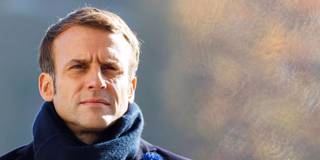After setting high expectations when he won the French presidency in 2017, Emmanuel Macron will need to devise a more realistic and down-to-earth agenda for his second term. Although his options for influencing international affairs have not been exhausted, they are more limited than they were five years ago.
PARIS – Within Europe, French President Emmanuel Macron’s victory over the far-right leader Marine Le Pen has been broadly welcomed. After all, although Le Pen abandoned her old idea of ditching the euro, she still views the European Union as a threat to French sovereignty – a force that prevents the government from protecting the French people from the perils of globalization.
Among other things, Le Pen wanted to reconsider the Franco-German alliance (the bedrock of the European project since its beginning), leave NATO’s integrated military command, and seek reconciliation with Russia, despite its invasion of Ukraine. Her admiration for Russian President Vladimir Putin is ideologically motivated: He supposedly defends Christian civilization against Muslims and shares her contempt for LGBT rights. But the affinity is also psychological and financial. Le Pen and the rest of the far right long for a strongman; and in 2014, her party received a €9.4 million ($10 million) loan from a Russian bank.
But while Macron’s 2017 victory over Le Pen triggered an outpouring of enthusiasm (the cover of The Economist depicted him walking on water), his re-election elicited only a sigh of relief. Macron did not meet Europeans’ lofty expectations during his first term. Some of his difficulties, such as the “yellow vests” (gilets jaunes) protests and the perception that he is a “president of the rich,” were of his own making. Others, such as Donald Trump’s presidency in the United States, Brexit, and then COVID-19, confronted him with tests for which he was not always prepared.

PARIS – Within Europe, French President Emmanuel Macron’s victory over the far-right leader Marine Le Pen has been broadly welcomed. After all, although Le Pen abandoned her old idea of ditching the euro, she still views the European Union as a threat to French sovereignty – a force that prevents the government from protecting the French people from the perils of globalization.
Among other things, Le Pen wanted to reconsider the Franco-German alliance (the bedrock of the European project since its beginning), leave NATO’s integrated military command, and seek reconciliation with Russia, despite its invasion of Ukraine. Her admiration for Russian President Vladimir Putin is ideologically motivated: He supposedly defends Christian civilization against Muslims and shares her contempt for LGBT rights. But the affinity is also psychological and financial. Le Pen and the rest of the far right long for a strongman; and in 2014, her party received a €9.4 million ($10 million) loan from a Russian bank.
But while Macron’s 2017 victory over Le Pen triggered an outpouring of enthusiasm (the cover of The Economist depicted him walking on water), his re-election elicited only a sigh of relief. Macron did not meet Europeans’ lofty expectations during his first term. Some of his difficulties, such as the “yellow vests” (gilets jaunes) protests and the perception that he is a “president of the rich,” were of his own making. Others, such as Donald Trump’s presidency in the United States, Brexit, and then COVID-19, confronted him with tests for which he was not always prepared.